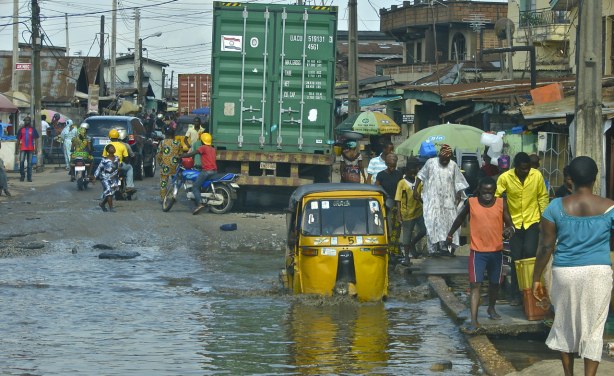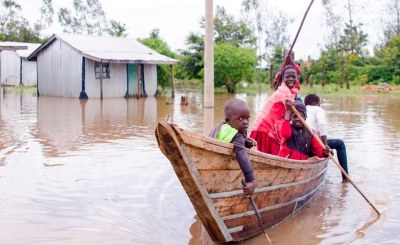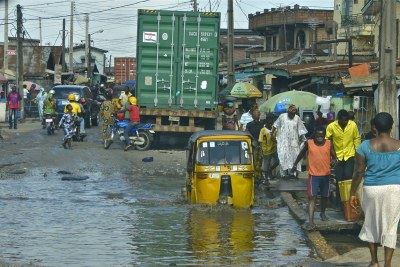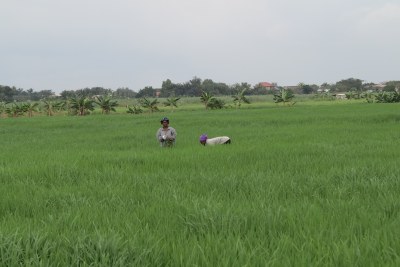-
Nigeria: Dogged By Massive Floods, Nigeria Ramps Up Actions to Tackle Climate Crisis
Africa Renewal, 27 October 2021
The Nigerian government on 30 July 2021 submitted to the United Nations Framework Convention on Climate Change (UNFCCC) its first Nationally Determined Contributions (NDC) - the… Read more »
-
Nigeria: Country Has a Flooding Challenge - Here's Why and What Can Be Done
The Conversation Africa, 25 October 2021
One of the most prevalent natural disasters in Nigeria is perennial flooding. Some states are increasingly experiencing annual flooding during the rainy season. Read more »
-
Nigeria: Why Cities in Nigeria Are Prone to Flooding - Experts
Vanguard, 22 September 2021
Lack of proper urban planning has been blamed for the reoccurring cases of flooding in most cities across Nigeria. Read more »
-
Nigeria: Brace Up for More Floods, Govt Alerts
Daily Trust, 29 July 2021
The Nigeria Hydrological Services Agency (NIHSA), an agency of the Federal Ministry of Water Resources, has predicted more devastating floods from the end of August to early… Read more »
-
Nigeria: Building Resilience Against Urban Flooding
This Day, 6 October 2021
Across Nigeria the annual wet season sees our news reports and social media feeds 'flooded' with images of commuters wading through rain and sewerage to get home, cars washed off… Read more »
-
Nigeria: Dealing With the Lagos Floods
This Day, 2 August 2021
The authorities should audit environmental plans to mitigate flooding disasters Read more »
-
Africa: New Tools to Map Flood Risk Will Help Bring Disaster Planning Up to Date
The Conversation Africa, 25 October 2021
About 90% of natural disasters are water-related - most notably cyclones, floods and droughts. Read more »
How Nigeria Can Deal with Flooding #AfricaClimateCrisis
One of the most prevalent natural disasters in Nigeria is perennial flooding during the rainy season in many states. Unlike some natural disasters, rainfall flooding can be controlled with proper planning and the provision of necessary infrastructure.
Nigeria's flooding is mainly human-induced, with poor urban planning and inadequate environmental infrastructure being contributing factors. The extent and nature of Nigeria's flooding are such that the actual figures for displacements, losses, and fatalities cannot be truly ascertained due to poor records and reporting, writes Adaku Jane Echendu for The Conversation.
President Muhammadu Buhari has said that while the Covid-19 pandemic has taken a heavy toll on the economy, "floods have also caused large-scale destruction to farmlands, thereby impacting negatively on our efforts to boost local production in line with our policy to drastically reduce food importation".
What is missing is appropriate action to mitigate the flooding. Currently, there is no flood management policy in Nigeria. The lack of relevant legal and policy frameworks is an indication of the low importance given to controlling and managing flooding in Nigeria.
InFocus
-
Climate change will expose up to 118 million extremely poor African people to drought, floods and extreme heat by 2030 if it is not addressed urgently. It could cut gross domestic ... Read more »
-
The National Emergency Management Agency Director-General Muhammadu Muhammed, has said that floods in 2020 has impacted 35 states, including the Federal Capital Territory, and 320 ... Read more »
-
Devastating floods has seen the country lose more than two million tons of rice, a quarter of the projected harvest. This has sparked concerns that the current food insuffiency ... Read more »

Hundreds have been displaced due to floods in Nigeria this year (file photo).




